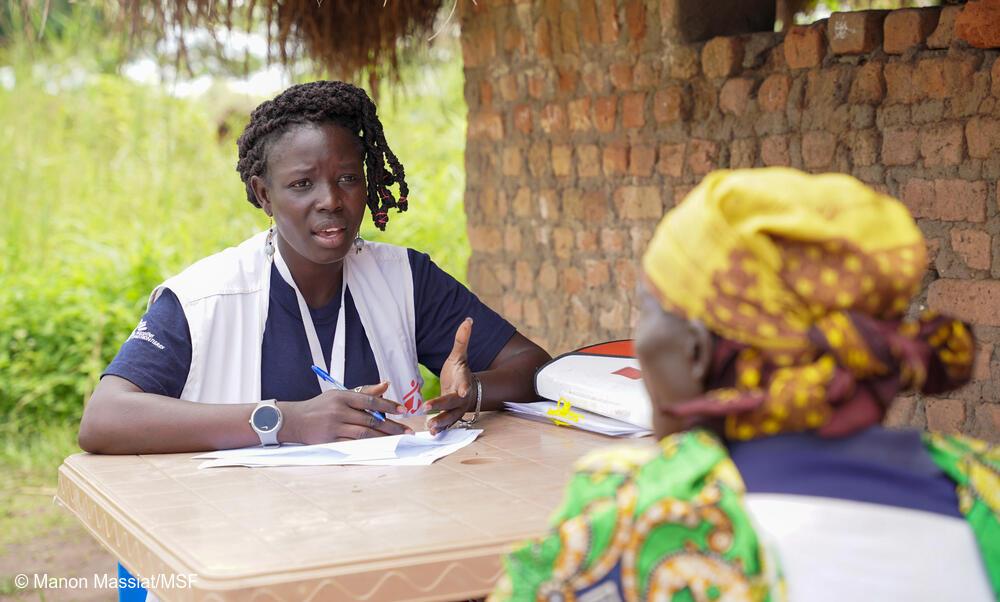Under the canopy of the tent, teenage boys sit cross-legged, with their eyes closed. The sound of the wind rattling the tent cloth is all that can be heard.
“Inhale, hold your breath, and exhale. One more time.”
Eunice Soro, a mental health counsellor working for Medecins Sans Frontieres (MSF) at Yei in Central Equatoria state, conducts a breathing exercise with the group of teenage boys, teaching them how to cope with stress.
On regular basis, MSF comes to Yogufe, a remote village in Morobo County, to set up a mobile clinic and provide essential healthcare to isolated communities. Eunice always joins the teams and spends the entire day raising awareness and conducting individual and group sessions on psychological wellbeing with men, women and youth.
Eunice Peter Soro, MSF Mental Health Counselor, conducts an awareness session on mental health at an MSF mobile clinic in Morobo County, Central Equatoria.
Traumatised communities
In Yei and Morobo counties, Central Equatoria, southern South Sudan, many communities are traumatised due to ongoing armed conflict between the state and non-state actors in the area, where many people have been facing displacement and abuse for decades.
“We have met patients who have been enduring violence, abductions and torture,” says Eunice. “Many have lost family members, because they supported one side or the other of the conflict. As a result, a lot of them suffer from post-traumatic stress disorder, which has a heavy impact on their health, preventing them from recovering physically,” she says.
Since 2017, MSF has been implementing mental health activities in its clinic in Yei Town and seven outreach locations in the region, where a team of four counsellors and community workers are supporting and treating patients daily. Among them, many women and children are survivors of sexual violence.
Mental health cards during a self-care session for MSF mental health staff in Yei, Central Equatoria.
MSF mental health teams work closely with community leaders from surrounding villages, especially when it comes to sexual and gender base violence (SGBV) survivors. MSF has implemented a specific pathway to ensure provision of care in a safe and confidential way.
“Community leaders identify and refer survivors to MSF, advising them to go to our facilities holding a specific object”, explains Eunice. “Our teams then straightway know why these patients are coming and guide them to dedicated medical and mental health care. Mental health activities relating to sexual violence cases are very important and should broadly be integrated into the healthcare services.”
Supporting patients – and the staff
To be able to support and treat patients, mental health counsellors also need support and mental healthcare. Regularly, Eunice and her colleagues participate in self-care workshops or specific trainings organised by a psychologist. They share coping mechanisms, learn about relaxation exercises and emphasise the importance of taking care of oneself, to be able to take care of patients.
“At the end of the day, we hear a lot of stories that can also affect us and the quality of care we provide to our patients. These workshops are important as they help us understand and prioritise our needs as counsellors,” says Eunice.
Jennifer Simon, Community Mental Health Worker and Eunice Peter Soro, Mental Health Counselor, listen to a psychologist during a self-care session for MSF mental health staff in Yei, Central Equatoria.
Still a fight
Mental health is still not regarded as important among communities in South Sudan, especially among those who live in isolated areas. However, Eunice and her colleagues are optimistic.
“Mental health is still a fight. It is not something that is easy; we have to speak about it on daily basis, but communities show interest in our activities, and they appreciate our support,” says Eunice.
“This is why I decided to join MSF. We are not only helping on the medical part, but we are also providing psychological help to communities that desperately need it.”
